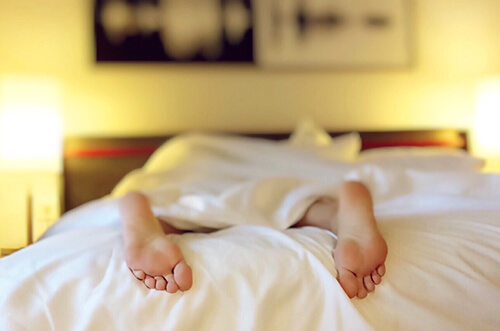
A common question often asked by snorers is “What’s the difference between snoring and sleep apnea?” Studies show that 90 million Americans suffer from snoring, but half as many of those may have sleep apnea. Let’s take a closer look at each condition to explore the differences and when they might intersect.
Snoring occurs when the tissues in the throat and airway flap against each other. This creates the sound that most of us are familiar with. There are several reasons people snore that may not have anything to do with sleep apnea. These include:
Once you reach middle age, your throat becomes narrower and its muscle tone decreases.
Men are more likely to snore because their air passages are narrower. Scientists aren’t sure exactly why men have narrower air passages, but it appears to be a physiological difference that occurs from birth. Other physical characteristics that can lead to snoring include a narrow throat, a cleft palate, and enlarged adenoids.
When airways are blocked with mucus, that makes breathing difficult which causes snoring.
Poor muscle tone and fatty tissue around the neck and throat can lead to snoring.
These can all increase muscle relaxation, leading to snoring.
Sleeping on your back can cause the flesh in your throat to relax, blocking the airway.
Once again, it’s entirely possible to suffer from snoring without having sleep apnea due to any of the causes above. However, even if you’re a light or moderate snorer, you should not assume your snoring issue is benign. It could be a sign of sleep apnea, which is a serious, or even life threatening condition.
Sleep apnea occurs when an individual stops breathing for several seconds and in some cases minutes. This occurrence is commonly referred to as an “apneic event.” There are several types of sleep apnea, but the most common is Obstructive Sleep Apnea (OSA) in which the airways are obstructed or collapsed, making it difficult if not impossible to breathe properly. While loud snoring can be a symptom of sleep apnea, there are several other symptoms that may accompany the disorder including:
Untreated sleep apnea can result in heart failure, stroke, Type 2 diabetes and more. The side effects of sleep apnea can be very dangerous to your long term health and wellbeing.
There’s unfortunately no simple test that you can take yourself that can determine if your snoring is related to sleep apnea. Because of this, you should address any medical concerns with a sleep specialist/physician who will be able to make a determination whether to proceed with an overnight sleep test. A sleep test is commonly done in a sleep lab, but many sleep centers today (including NYC SleepWell) offer a home sleep test for your convenience and comfort.
Depending on the severity of your sleep apnea, which will be determined by your sleep test, treatment could include a CPAP machine, a custom oral appliance, or surgical treatments. For mild sleep apnea, weight loss and a change in your lifestyle and sleeping habits may be the only recommendation. It’s important to note that there are many store-bought anti-snoring devices (mouthguards) that are heavily advertised. While these devices may offer a temporary fix for snoring, none of them is designed to treat sleep apnea. If you are a regular snorer and/or suffer from any of the other symptoms of sleep apnea, it’s vital that you schedule an appointment at a sleep center to determine if your snoring is indeed a sign of sleep apnea. Once your sleep specialist makes that determination, your treatment plan can then be customized to address your condition and specific needs. Finally, if you have a child who suffers from snoring, please don’t dismiss it. Although not as common with adults, sleep apnea in children can affect them in many ways, including lack of focus and learning difficulties. In fact, due to a lack of awareness by parents, teachers and pediatric physicians, sleep apnea in children is commonly misdiagnosed as ADHD. Our goal at NYC SleepWell, plain and simple, is to help you sleep well – and be healthy!